How Artificial Intelligence Is Shaping the Future of Education
Artificial Intelligence is revolutionizing education by personalizing learning experiences for students. This technology adapts to individual needs, promoting engagement and self-directed learning. Furthermore, AI tools streamline administrative tasks, allowing educators to focus on teaching. However, the integration of AI raises critical ethical questions, particularly regarding data privacy and bias. As educational institutions embrace these advancements, they must navigate the complexities that accompany them. What implications will this have for future learning environments?
The Rise of Personalized Learning Through AI
As educators increasingly embrace technology, personalized learning through artificial intelligence has emerged as a transformative force in the educational landscape.
By utilizing adaptive assessments, AI tailors educational experiences to meet each student’s unique needs. This approach fosters engagement and autonomy, while individualized feedback empowers learners to take control of their progress.
Ultimately, this promotes a more liberated and effective learning environment that nurtures personal growth.
See also: Ethical Considerations in Artificial Intelligence Development
Enhancing Administrative Efficiency With AI Tools
Administrative processes in education often present significant challenges, from managing schedules to handling communications and resource allocation.
AI tools streamline these tasks by enhancing data management, allowing institutions to allocate resources more effectively.
With intelligent algorithms, educational leaders can automate routine operations, freeing up valuable time and fostering an environment where creativity and innovation flourish, ultimately empowering educators and students alike.
Fostering Inclusivity and Accessibility in Education
While traditional educational environments often struggle to accommodate diverse learning needs, the integration of artificial intelligence presents a transformative opportunity for fostering inclusivity and accessibility.
Adaptive technologies empower educators to tailor learning experiences, ensuring equitable resources reach all students.
Addressing the Challenges and Ethical Considerations of AI in Education
Despite the promising potential of artificial intelligence in education, significant challenges and ethical considerations demand careful examination.
Issues such as data privacy threaten student security, while algorithm bias may perpetuate inequality in learning outcomes.
As educational institutions harness AI’s capabilities, they must prioritize transparency and fairness, ensuring that technology serves as a tool for liberation rather than a mechanism for oppression.
Conclusion
In conclusion, artificial intelligence stands as a beacon of transformation in education, illuminating pathways to personalized learning and administrative efficiency. As classrooms evolve into vibrant ecosystems tailored to individual needs, the potential for inclusivity and accessibility expands exponentially. However, this remarkable advancement also brings forth ethical dilemmas that must be navigated with care. By addressing these challenges, educators can harness AI’s colossal power, ensuring a future where every student thrives in an equitable learning landscape.



